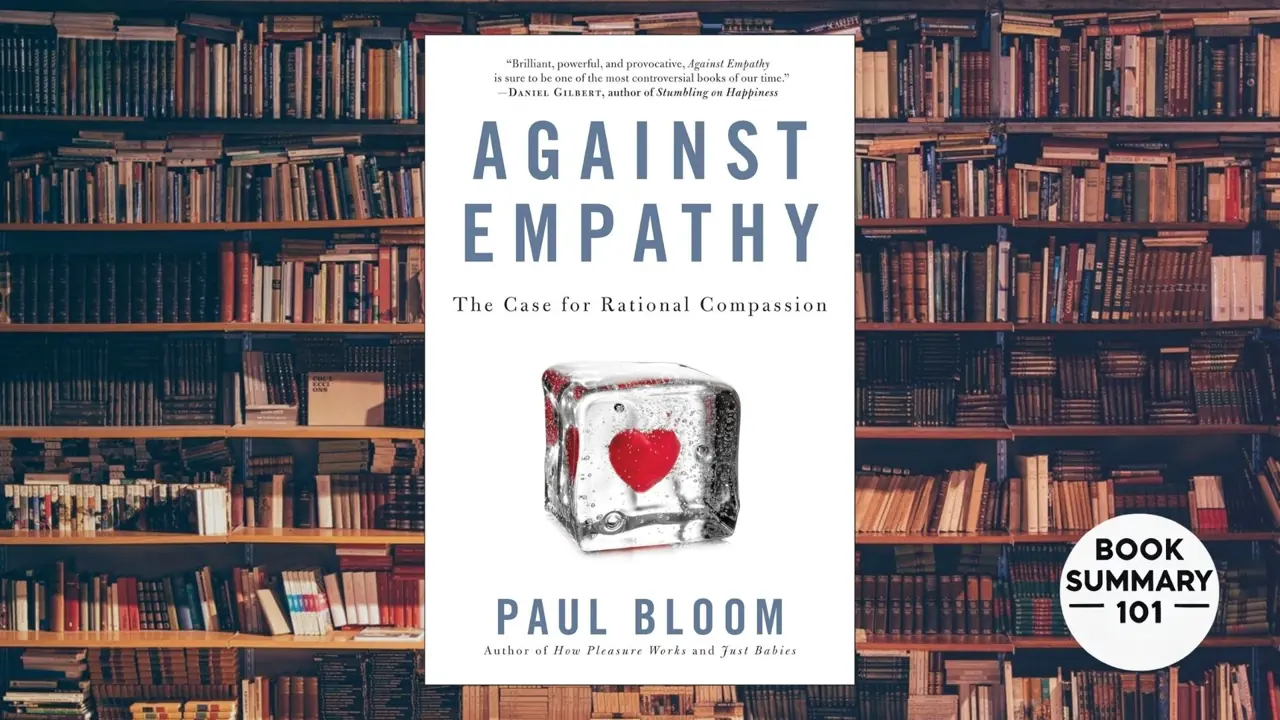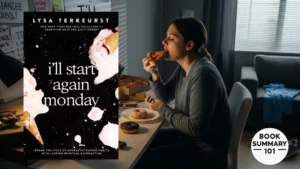I used to think that empathy was the ultimate superpower.
You know the feeling. You see a sad news story, your chest tightens, and you think, “If everyone just felt more empathy, the world would be a paradise.” I spent years beating myself up because I couldn’t emotionally shoulder the weight of every tragedy I saw on my Twitter feed. I thought my inability to constantly “feel” the pain of others was a character flaw.
Then I picked up Against Empathy: The Case for Rational Compassion by Paul Bloom.
It was like a splash of cold water in the best possible way.
Suddenly, I was having a conversation with a brilliant friend who told me, “Hey, stop beating yourself up. That emotional burnout you’re feeling? That’s not a virtue. In fact, it might be making you—and the world—worse at actually solving problems.”
If you have ever felt overwhelmed by the state of the world or wondered why “nice” people sometimes support terrible policies, this summary is for you. Let’s dive into why your gut feelings might be leading you astray.
- Why Should You Even Bother Reading It?
- The Principles of Rational Compassion
- 1. The Spotlight Effect: Why Empathy is Biased
- 2. Empathy vs. Compassion: The MRI Technician
- 3. Innumeracy: Why Our Hearts Can’t Do Math
- 4. The Angry Mob: Empathy as a Weapon
- 5. The Bedroom vs. The Senate: Context Matters
- My Final Thoughts
- Join the Conversation!
- Frequently Asked Questions (The stuff you’re probably wondering)
Why Should You Even Bother Reading It?
You might be thinking, “Against empathy? That sounds like a book for psychopaths.”
Hear me out. This book is essential reading for anyone who wants to actually do good rather than just feel good. Whether you are a leader trying to manage a team, a parent raising kids, or just a voter trying to make sense of politics, this book challenges the sacred cow of modern morality.
It teaches you that relying on your gut feelings often leads to unfairness and tribalism. If you want your kindness to actually count, you need to understand the difference between feeling someone’s pain and actively deciding to help them.
The Principles of Rational Compassion
Before we get into the weeds, we have to flip the script on how we define being a “good person.” Bloom argues that we need to move away from the narrow spotlight of feelings and toward a broader, more logical system of caring.
1. The Spotlight Effect: Why Empathy is Biased
Imagine you are in a massive, pitch-black theater filled with people in danger. You have a spotlight that you can shine anywhere.
When you point that spotlight at one specific person—say, a crying child—you see them vividly. You see their tears, you hear their voice, and you feel an intense urge to rush over and help them.
But here is the problem: The spotlight is narrow. By focusing so intensely on that one person, you are leaving hundreds of others in the dark.
Bloom argues that empathy acts exactly like this spotlight. It is biased toward the specific, the visible, and the “cute.”
We feel immense empathy for a trapped puppy or a single child stuck in a well (the identifiable victim). But we feel almost nothing for abstract statistics, like thousands of people affected by a subtle tax policy or climate change.
Real-World Example:
Think about how the news works. A story about one specific person who had a bad reaction to a vaccine might go viral, causing panic. Meanwhile, the data showing that the vaccine saved 100,000 lives is boring and “unfeeling,” so we ignore it. Empathy makes us prioritize the one over the many.
📖 “Empathy is a spotlight focusing on certain people in the here and now. This makes us care more about them, but it leaves us insensible to the long-term consequences of our acts and blind as well to the suffering of those we do not or cannot empathize with.”
Simple Terms: Empathy makes us zoom in on one person and ignore everyone else.
The Takeaway: Just because you can “see” a victim doesn’t mean they are the only one who needs help; we need to look at the big picture.
2. Empathy vs. Compassion: The MRI Technician
This is the most important distinction in the book, so let’s break it down.
Bloom separates “Emotional Empathy” from “Rational Compassion.”
- Emotional Empathy: This is trying to feel exactly what the other person feels. If they are panicking, you panic. If they are sad, you cry.
- Rational Compassion: This is caring about the person and wanting them to be better, but keeping your distance emotionally so you can help.
Think of it like this: Imagine you need complex surgery. You are terrified. Your heart is racing.
Do you want a surgeon who has high emotional empathy? Do you want a surgeon who is literally trembling with fear because you are trembling with fear? No! You want them to be calm, cool, and collected. You want them to care about saving your life (compassion), not to share your panic (empathy).
Real-World Example:
Consider a therapist. If a therapist burst into tears and curled into a ball every time a patient shared a trauma, they would be useless. The best therapists have “rational compassion”—they want to help you heal, but they don’t let your feelings drown them.
Simple Terms: Empathy is feeling with someone; compassion is caring for someone.
The Takeaway: You can be a kind, loving person without dragging yourself through someone else’s emotional mud.
3. Innumeracy: Why Our Hearts Can’t Do Math
Our emotions are terrible at mathematics.
If I told you that one child was suffering, your heart would break. If I told you two children were suffering, you wouldn’t feel twice as sad. If I told you a billion people were suffering, your brain would actually shut down.
Bloom explains that empathy doesn’t scale. It is triggered by stories, not numbers.
Imagine you are sorting LEGOs. If you have to sort 5 bricks, it’s easy. If you have to sort 5,000, you give up. Empathy is the same way. We maximize our help for the “one,” but we become numb to the “many.”
This is dangerous for public policy. We might spend millions of dollars to save one specific, photogenic victim because it feels good, while ignoring preventative measures that could save thousands of nameless people for a fraction of the cost.
Real-World Example:
The “Make-A-Wish” foundation is beautiful, often spending thousands of dollars to give one terminally ill child a great day. However, that same amount of money could buy malaria nets that would statistically save the lives of dozens of children in developing nations. Empathy chooses the wish; rational compassion chooses the nets.
Simple Terms: We care more about one sad story than a million sad statistics.
The Takeaway: To do the most good, we have to use logic and data, not just our heartstrings.
4. The Angry Mob: Empathy as a Weapon
We usually think of empathy as a soft, fluffy emotion. But Bloom points out a darker side: Empathy is a primary driver of violence and war.
Wait, what?
Think of the “Mama Bear” analogy. When a mother bear sees her cub in danger, she feels intense empathy for the cub. That empathy immediately translates into vicious aggression toward whatever is threatening it.
When we feel empathy for a “victim” in our group (our tribe, our country, our family), we often feel intense hatred toward the “perpetrator.” Politicians know this. They use stories of innocent victims to whip up anger and justify wars, harsh punishments, or cruelty toward outsiders.
📖 “Empathy essentially acts as a trigger for aggression against those who threaten the objects of our empathy.”
Real-World Example:
Look at almost any war propaganda poster in history. They almost always depict a helpless woman or child (to trigger empathy) being threatened by a scary enemy. The empathy for the victim bypasses our logic and makes us ready to fight.
Simple Terms: Loving “us” too much often leads to hating “them.”
The Takeaway: Be careful when a story makes you angry on someone else’s behalf; that empathy can be manipulated to make you cruel.
5. The Bedroom vs. The Senate: Context Matters
Bloom isn’t saying we should become robots. He clarifies that empathy has a place—it just shouldn’t be in the Senate.
Think of empathy like a candle.
In a small, dark bedroom with your lover or your child, a candle is perfect. It creates intimacy, warmth, and connection. You should feel empathy for your spouse. If your wife is crying and you start quoting statistics at her, you’re a jerk.
But if you are trying to light up a whole city (public policy), a candle is useless. You need electricity (reason and cost-benefit analysis).
Bloom argues that empathy is great for personal relationships, art, and fiction. It makes life rich. But it is a terrible tool for making decisions that affect millions of people.
Real-World Example:
When deciding on criminal justice reform, we shouldn’t rely on the empathy we feel for one victim’s family statement on TV. We should look at what policies actually reduce crime rates and make society safer for everyone.
Simple Terms: Use your heart for your family; use your head for politics.
The Takeaway: Keep empathy for your private life, but use rational compassion for public decisions.
My Final Thoughts
Reading Against Empathy honestly felt like a weight being lifted off my shoulders. It gave me permission to be “cold” in my thinking so that I could be “warm” in my actions.
I realized that by trying to emotionally mirror every tragedy, I wasn’t helping anyone—I was just exhausting myself. Bloom’s argument for “Rational Compassion” empowers us to step back, look at the data, and make choices that actually improve the world, even if they don’t give us that immediate warm-and-fuzzy emotional hit.
It’s not about caring less. It’s about caring smarter.
Join the Conversation!
Here is my question for you: Have you ever made a decision based on “gut feeling” or empathy that you later realized was actually unfair or unhelpful? I’d love to hear your stories in the comments below!
Frequently Asked Questions (The stuff you’re probably wondering)
1. Is Paul Bloom saying we should be psychopaths?
No, absolutely not. He advocates for compassion—caring for people and wanting them to be happy. He just thinks we shouldn’t need to feel their exact pain to be motivated to help them.
2. Do I need a psychology degree to understand this book?
Not at all. Bloom writes in a very accessible, witty style. It’s pop-psychology at its best—smart but easy to read.
3. Isn’t empathy the only thing stopping us from hurting each other?
Bloom argues that we have many other brakes on bad behavior: self-control, reason, religious beliefs, and a general concern for human rights. We don’t need to “feel” someone’s pain to know that punching them is wrong.
4. Does this book relate to Effective Altruism?
Yes, heavily. If you like the ideas of Effective Altruism (using evidence and reason to determine the most effective ways to benefit others), you will love this book. It provides the psychological backing for that movement.
5. Is the book entirely negative about empathy?
Mostly, yes regarding “emotional empathy” in decision making. However, he admits it’s wonderful for art, sports, and intimate personal relationships. He just wants to keep it out of the voting booth.



